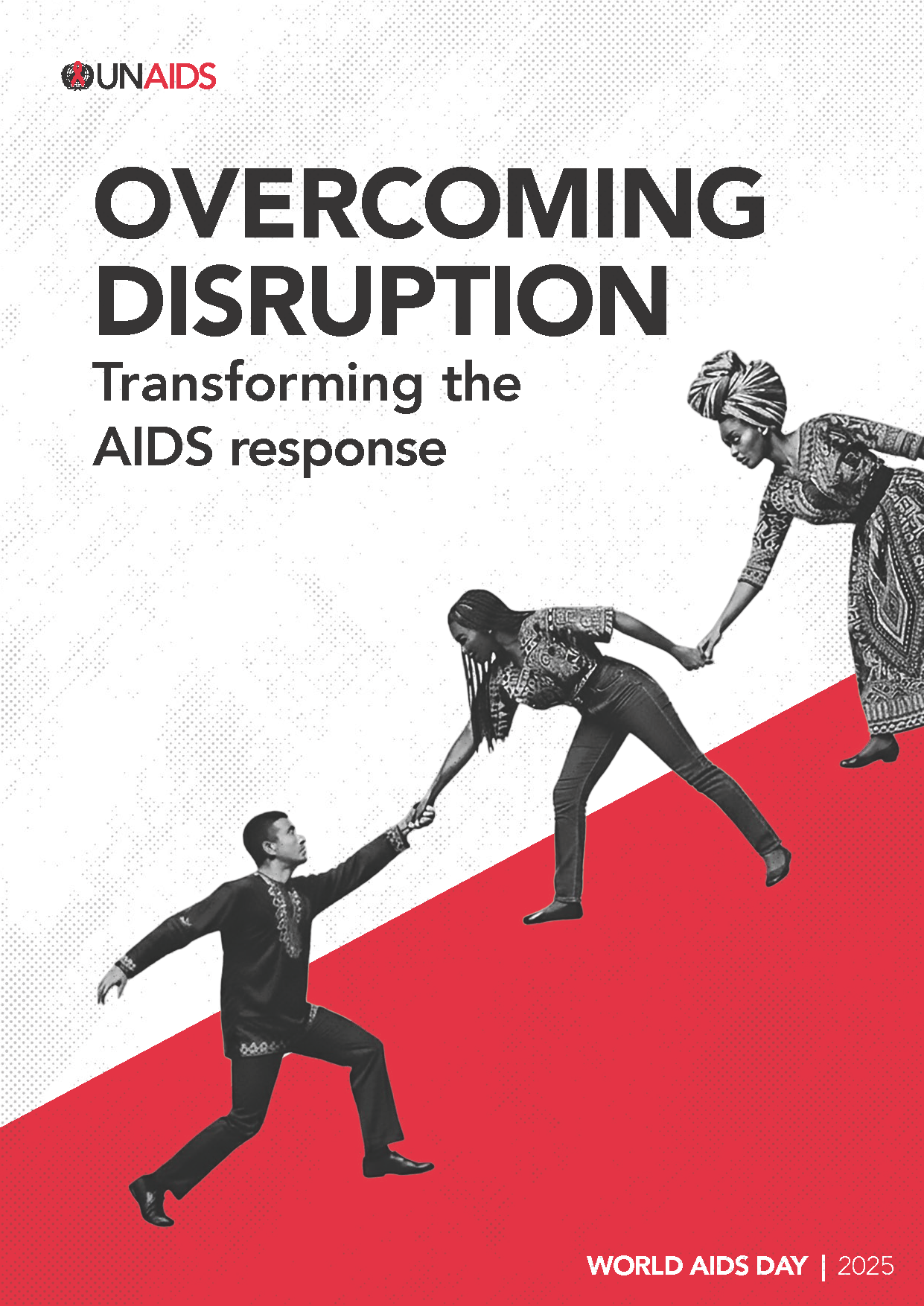
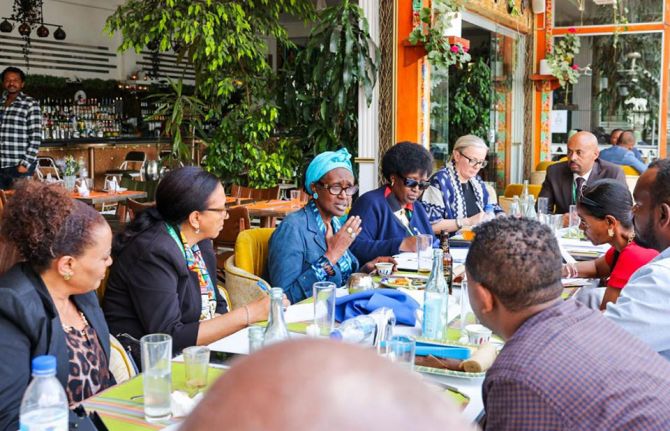
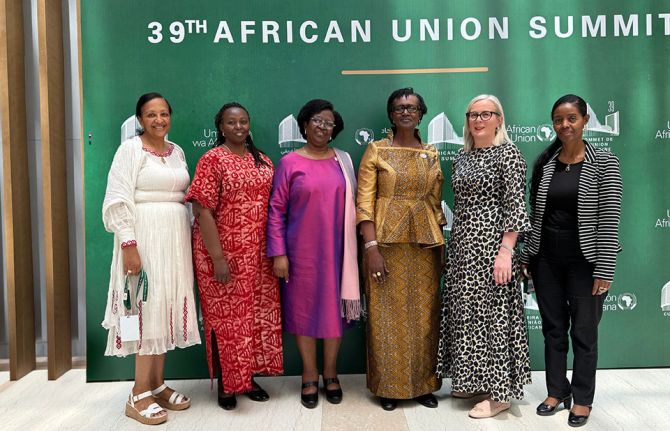
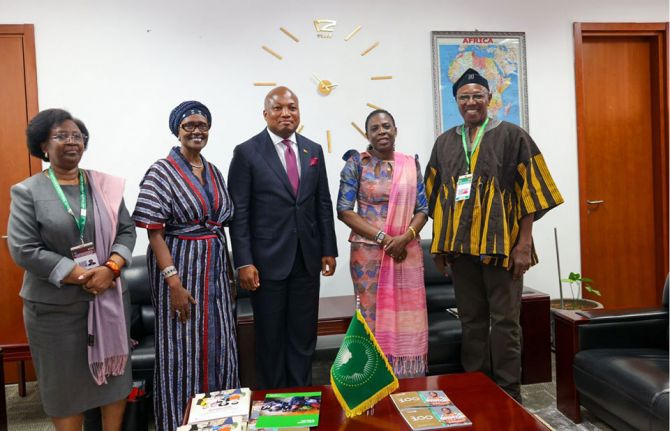
Press Release
UNAIDS rallies African leaders to remain united to end AIDS
17 February 2026 17 February 2026GENEVA, 17 February 2026—At the 39th African Union summit, UNAIDS urged African leaders to stay united, keep HIV high on the political agenda and move towards sustainable financing for health and development.
“AIDS is not over in Africa and continued African leadership is essential,” said Winnie Byanyima, Executive Director of UNAIDS. “Now is the moment to raise ambition, safeguard our gains and ensure Africa drives the global agenda for a sustainable and sovereign health future.”
In 2024, 82% of people living with HIV in Africa were on lifesaving treatment compared with 45% just ten years earlier. New HIV infections were reduced by 71% since their peak in 1994 and AIDS-related deaths were reduced by 75% since the peak in 2004.
However, 26.5 million people were living with HIV in Africa in 2024, which represents 65% of global total—4.8 million of whom were still not accessing HIV treatment. There were 390 000 AIDS-related deaths in 2024, representing more than 60% of AIDS deaths globally.
The summit took place as Africa advances on health sovereignty and more equitable global cooperation through initiatives like the Accra Reset, the Lusaka agenda, and the African Union Roadmap to 2030. UNAIDS underscored the importance of anchoring HIV sustainability within this broader agenda to ensure resilient, community centred health systems across the continent.
African countries are facing serious financial pressure, with debt repayments often outstripping health spending, and revenue collection that has stalled below 16% of GDP for over a decade. Securing Africa’s health sovereignty will require action to relieve debt, fight tax dodging, increase revenue collection, and ensure access to affordable financing.
In 2024, 77% of funding for Africa’s HIV response came from external sources. Significant disruption to the financing landscape has left serious gaps, particularly for HIV prevention and community health systems, which are often the most reliant on external financing. This continues even as funding from Africa’s largest HIV donor, the United States, has partially returned.
UNAIDS’ approach to HIV sustainability places the focus on transforming the HIV response and accompanying countries on their transition journey—especially in convening partners, strengthening data and evidence, advancing integration processes and keeping communities at the table.
Twenty-two African countries, with support from UNAIDS and partners, are developing sustainability and transition plans to secure an increasingly self-reliant HIV response beyond 2030, planning for increased domestic investments and accelerated integration into national health systems. Eleven African countries have already reported increases in their national HIV budgets for 2026, demonstrating political commitment to long-term sustainability.
Multilateralism and global solidarity have been a cornerstone of progress in the response to HIV. The 2026 United Nations General Assembly High Level Meeting (HLM) on HIV/AIDS offers an opportunity to secure ambitious global commitments for the next five years. A strong Common African Position will be critical to influencing the global agenda and ensuring African priorities are reflected in the 2026 Political Declaration on AIDS.
The Political Declaration will build on the Global AIDS Strategy 2026–2031, adopted by the UNAIDS Programme Coordinating Board in December 2025, which was shaped with input from governments, communities, regional bodies and the private sector.
For more information see “Africa united to End AIDS”
UNAIDS
The Joint United Nations Programme on HIV/AIDS (UNAIDS) leads and inspires the world to achieve its shared vision of zero new HIV infections, zero discrimination and zero AIDS-related deaths. UNAIDS unites the efforts of 11 UN organizations—UNHCR, UNICEF, WFP, UNDP, UNFPA, UNODC, UN Women, ILO, UNESCO, WHO and the World Bank—and works closely with global and national partners towards ending the AIDS epidemic by 2030 as part of the Sustainable Development Goals. Learn more at unaids.org and connect with us on Facebook, Twitter, Instagram and YouTube.


Press Release
UNAIDS strongly welcomes bold, new US funding package for HIV
05 February 2026 05 February 2026GENEVA, 5 February 2026—UNAIDS welcomes the signing into law of a bipartisan US$ 5.88 billion spending package that reinforces the continued commitment and leadership of the United States in the global response to HIV.
US President Donald Trump signed the consolidated spending package into law on 3 February 2026 which allocates US$ 4.6 billion to bilateral HIV support through the America First Global Health Strategy, US$ 1.25 billion to the Global Fund to Fight AIDS, Tuberculosis and Malaria and US$ 45 million to UNAIDS.
“I thank President Trump and the US Congress for their continued commitment to HIV and global health,” said Winnie Byanyima, Executive Director of UNAIDS. “This US investment will provide life-saving support for millions of people in partner countries and help to ensure that the global HIV response remains efficient, data-driven and delivers results.”
The law advances the America First Global Health Strategy, which emphasizes the achievement of UNAIDS’ 95-95-95 targets as an integral part of ending AIDS as a public health threat by 2030 and accelerates the strategic shift towards country ownership and self-reliant HIV responses. For more than two decades, US investments have been the leading driver of the global HIV response, saving millions of lives and supporting countries' efforts to end their AIDS epidemics.
UNAIDS is committed to leverage the funding to provide data and rigorous technical and strategic support to countries and communities most affected by HIV and for the implementation of the America First Global Health Strategy, working closely with the US Government, the Global Fund, partner governments and communities.
Since the establishment of UNAIDS in 1996, the US Government has been a leading partner of UNAIDS and recently renewed its membership in the UNAIDS Programme Coordinating Board through to 2028.
UNAIDS
The Joint United Nations Programme on HIV/AIDS (UNAIDS) leads and inspires the world to achieve its shared vision of zero new HIV infections, zero discrimination and zero AIDS-related deaths. UNAIDS unites the efforts of 11 UN organizations—UNHCR, UNICEF, WFP, UNDP, UNFPA, UNODC, UN Women, ILO, UNESCO, WHO and the World Bank—and works closely with global and national partners towards ending the AIDS epidemic by 2030 as part of the Sustainable Development Goals. Learn more at unaids.org and connect with us on Facebook, Twitter, Instagram and YouTube.
Region/country

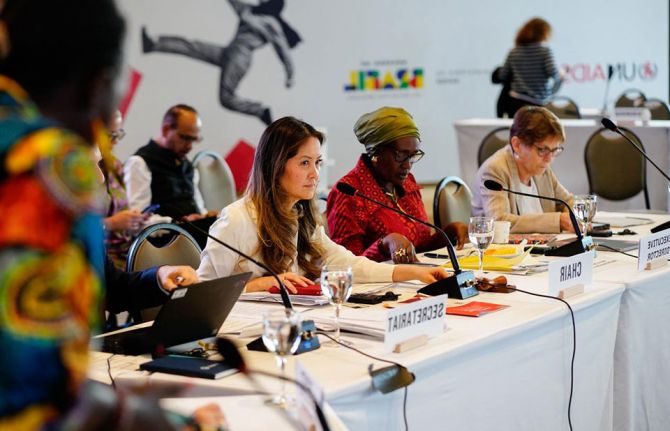
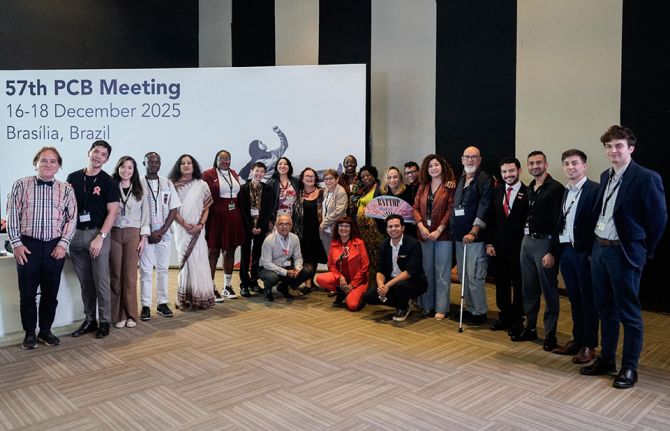
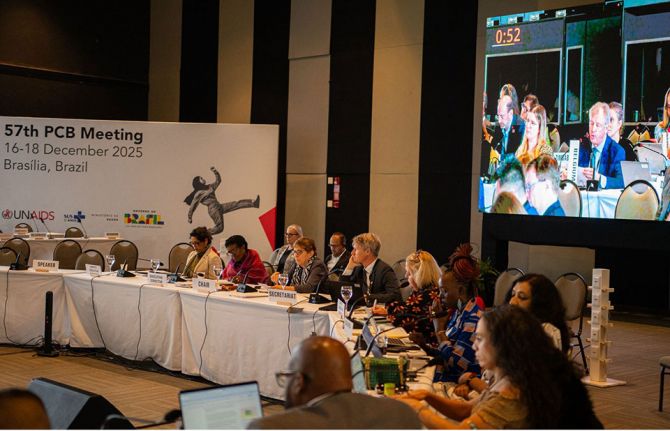
Press Release
New Global AIDS Strategy and Transition Working Group adopted at UNAIDS’ 57th Board meeting
19 December 2025 19 December 2025BRASILIA/GENEVA, 19 December 2025—The 57th Programme Coordinating Board (PCB) meeting concluded in Brazil this week at a time of severe disruptions to the HIV response in many countries and to the work of the UNAIDS Joint Programme. In this context, the Board adopted a new Global AIDS Strategy 2026-2031 for the world, “United to End AIDS."
“Inaction is not an option. If we stall and fail to reach the targets laid out in the Strategy, 3.3 million more people will be newly infected by 2030. We cannot allow that,” said Winnie Byanyima, Executive Director of UNAIDS.
During the three-day meeting, board members approved establishing a PCB Working Group to develop a plan and timeline for UNAIDS’ transition and integration into the UN system. The group will ensure meaningful engagement of all relevant constituencies – civil society, governments, Cosponsors, and other partners in-line with the UN80 initiative. “One of our key tasks through the Global AIDS Strategy, the transition of UNAIDS, and UN80 more broadly is to better understand how we can effectively encourage the international community to re-engage,” said Amina J. Mohammed, Deputy Secretary General of the United Nations. “Lives, dignity and hard-won progress are still on the line. UNAIDS has shown what collective action can achieve. This legacy must be protected.”
Throughout the meeting, PCB members and observers expressed deep appreciation for the critical role UNAIDS plays in the HIV response and UNAIDS staff. They spoke with conviction about what dedication means for governments and communities around the world.
“Brazil has reaffirmed, as a central government priority, the elimination of socially determined diseases, including the AIDS epidemic,” said Mariangela Simao, Brazil’s Vice Minister for Health Surveillance and Environment. “This agenda is grounded in our Unified Health System - universal, comprehensive and free of charge - which guarantees prevention, diagnosis and treatment across a country of continental scale and deep regional diversity,” she said.
“We cannot afford to backtrack when we made the promise to the most vulnerable,” said Erica Schouten, Ambassador of the Kingdom of the Netherlands to the United Nations. "We also cannot walk away at the very moment that the HIV response needs global solidarity more than ever.”
A sentiment echoed by the North America NGO delegate. “The inclusion of NGO voices in UNAIDS is not symbolic, it is foundational to the strength and legitimacy of the Joint Programme,” said Shamin Mohamed Jr. “A premature sunset of international coordination and support is a set-back. If we do things too soon, people’s lives will end too soon as well.”
The board recognized that UNDP, UNFPA, UNHCR, UNICEF, UNODC, and WHO will be lead Cosponsors and ILO, UNESCO, UN Women, WFP and the World Bank will be affiliate Cosponsors.
The Strategy and the 2030 targets will inform the United Nations General Assembly High-Level Meeting on AIDS and the Political Declaration on HIV/AIDS in 2026.
UNAIDS thanked its many donors for their steady support and 2025 contributions, including: Australia, Belgium/Flanders, Canada, Denmark, Germany, Ireland, Japan, Luxembourg, The Netherlands, Norway, Monaco, Spain and the United Kingdom.
The meeting’s thematic session on long-acting retrovirals– both for prevention and treatment – demonstrated how they can accelerate progress toward ending AIDS. With political will, financing, community leadership and partnerships, such medicines can transform the response, close the access gaps, and reduce new infections dramatically.
The 57th PCB was chaired by Brazil and going forward, the Board elected The Netherlands as Chair, the Philippines as Vice-Chair and Kenya as Rapporteur for 2026. The Report to the Board by the UNAIDS Executive Director, and the reports for each agenda item and the PCB’s decisions can be found here.The 58th meeting of the PCB will take place in Geneva on the 30th of June to the 2nd of July 2026.
UNAIDS
The Joint United Nations Programme on HIV/AIDS (UNAIDS) leads and inspires the world to achieve its shared vision of zero new HIV infections, zero discrimination and zero AIDS-related deaths. UNAIDS unites the efforts of 11 UN organizations—UNHCR, UNICEF, WFP, UNDP, UNFPA, UNODC, UN Women, ILO, UNESCO, WHO and the World Bank—and works closely with global and national partners towards ending the AIDS epidemic by 2030 as part of the Sustainable Development Goals. Learn more at unaids.org and connect with us on Facebook, Twitter, Instagram and YouTube.

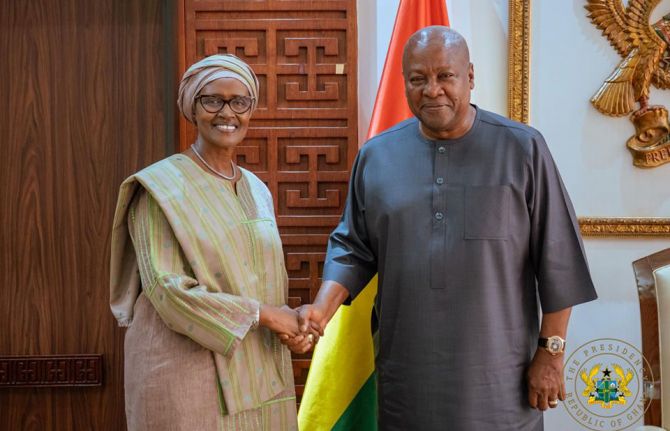
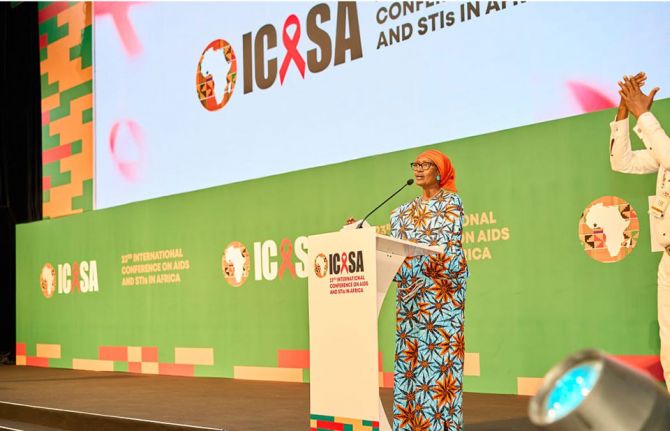
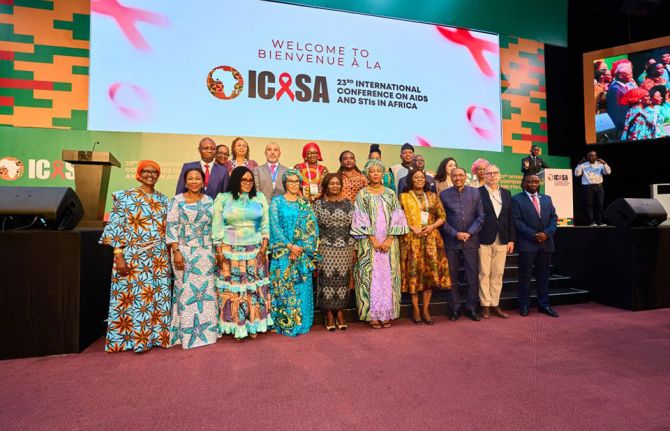
Press Release
UNAIDS calls on African leaders to resource the HIV response, protect human rights, and seize the opportunity of new innovations to end AIDS
10 December 2025 10 December 2025The Executive Director of UNAIDS Winnie Byanyima made the call during the African AIDS conference ICASA in Accra, Ghana saying “ending AIDS is a political choice”
ACCRA/GENEVA, 10 December 2025—African leaders can put the continent back on track to end AIDS by 2030 by choosing to resource the HIV response, protect human rights, and seize the opportunity of new innovations was the strong message brought by UNAIDS to the 23rd International Conference on AIDS and STIs in Africa (ICASA).
“Ours is the continent with the highest HIV burden in the world—we are only 19% of the world’s population, but we make up 65% of the total number of people living with HIV globally,” said Ms Byanyima. “More than half of the people waiting for treatment live here on this continent. More than half of all the new HIV infections every year happen here in Africa. Yet we have the science, the tools, the knowledge that’s needed to end AIDS. AIDS is no longer a medical challenge. Ending AIDS is a political choice.”
A sudden, rapid acceleration of cuts to international HIV financing, alongside spiralling debt burdens and a regression of human rights, is threatening fragile progress in reducing AIDS deaths and HIV infections – with HIV prevention and community-led services worst hit.
Addressing leaders at the conference, Ms Byanyima said that Africa was not being beaten down by the decline in foreign assistance, “Our continent is moving steadily towards more sustainable, inclusive, and domestically-financed HIV responses,”
UNAIDS is supporting governments to mobilise more domestic resources of HIV, developing roadmaps to move towards more sustainable HIV financing, urging international partners to support debt relief for health, and calling for regional initiatives – including the Accra Reset and African Union Roadmap to 2030 – to move from planning to implementation.
UNAIDS warned African leaders that the determined, organized and well-funded backlash against human rights and gender equality is pushing people further away from life-saving HIV services. The number of countries criminalising same-sex relationships has increased this year for the first time since UNAIDS began reporting.
“These laws are not African in origin, they are colonial-era imports, which are now reinforced by global ideological movements,” said Ms Byanyima. “To protect people’s health, we must protect their rights. There’s no choice there. This is at the heart of our belief, our African values, Ubuntu, which means “I am because we are.”
UNAIDS highlighted the potential of new long-acting HIV medicines to spark a HIV prevention revolution, to mirror the HIV treatment revolution of the last 30 years. This includes long-acting injectable PrEP, which prevents transmission with injections as little as twice a year. Ms Byanyima called on producers – particularly lenacapavir producer Gilead - to do more to enable access, including licensing generic production in sub-Saharan Africa and in Latin America. She urged African governments and international partners to invest in getting long-acting PrEP to all those who need it.
In the longer term, UNAIDS is calling for governments to invest in regional manufacturing and innovation. Ms Byanyima praised the Global Fund for procuring a first-line HIV treatment produced in Kenya which is now saving lives in Mozambique, and welcomed the Global Coalition for Local and Regional Production, Innovation and Equitable Access, launched under Brazil’s G20 Presidency to overcome unequal access to health technologies that often drive disease.
ICASA, the International Conference on AIDS and STI’s in Africa, is a biannual conference which was held this year in Ghana’s capital Accra between 3-8 December. ICASA brought together stakeholders from multilateral institutions, scientists, governments and community-led organizations to establish ways forward and keep the momentum to end AIDS by 2030 across the African continent.

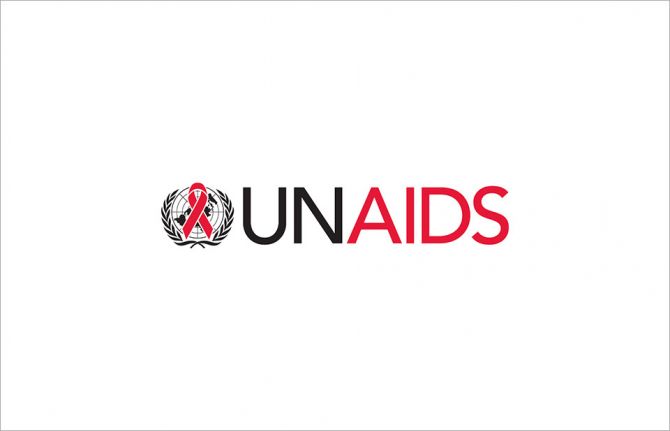
Press Release
UNAIDS welcomes new agreement between the United States and Kenya to advance progress to end AIDS and strengthen health systems
04 December 2025 04 December 2025WASHINGTON/GENEVA, 4 December 2025—UNAIDS welcomes the signing of a landmark five-year Health Framework for Cooperation between the United States Government and the Government of Kenya to advance strengthened cooperation on HIV and other key areas of health.
The agreement was signed today in Washington DC by US Secretary of State Marco Rubio and President of Kenya William Ruto. It builds on decades of shared commitment between the US and Kenya through the US President's Emergency Plan for AIDS Relief (PEPFAR) and represents a renewed demonstration of shared solidarity, co-investment, self-reliant systems and resolve to save lives, reduce new HIV infections, and advance progress towards ending AIDS in Kenya.
The agreement aligns with UNAIDS global targets—including ensuring that 95% of people living with HIV know their status, 95% of those diagnosed receive sustained, quality treatment, and 95% of those on treatment are virally suppressed. It also supports the goal of reducing new HIV infections and AIDS-related deaths by 90% by 2030, compared to 2010 levels.
In the signing, the US commits to provide up to US$ 1.6 billion over five years to support technical assistance, capacity building, and financial resources to reinforce Kenya’s national HIV and health response. In turn, Kenya has committed to provide around US$ 850 million in domestic funding to sustain and enhance the agreement.
UNAIDS considers today’s agreement between the US and Kenya a milestone in the future of global health cooperation, bringing renewed momentum to advance Kenya’s outstanding response to HIV and US leadership in the global HIV response.
As noted by Secretary Rubio, the agreement with Kenya is the first of 50 planned bilateral agreements with partner countries in coming weeks.
UNAIDS stands ready to support the US and Kenyan governments, civil society, communities, and other partners to support the implementation of this agreement and provide UNAIDS data and support. The historic global effort to end AIDS is advanced when governments and people stand together.
UNAIDS
The Joint United Nations Programme on HIV/AIDS (UNAIDS) leads and inspires the world to achieve its shared vision of zero new HIV infections, zero discrimination and zero AIDS-related deaths. UNAIDS unites the efforts of 11 UN organizations—UNHCR, UNICEF, WFP, UNDP, UNFPA, UNODC, UN Women, ILO, UNESCO, WHO and the World Bank—and works closely with global and national partners towards ending the AIDS epidemic by 2030 as part of the Sustainable Development Goals. Learn more at unaids.org and connect with us on Facebook, Twitter, Instagram and YouTube.

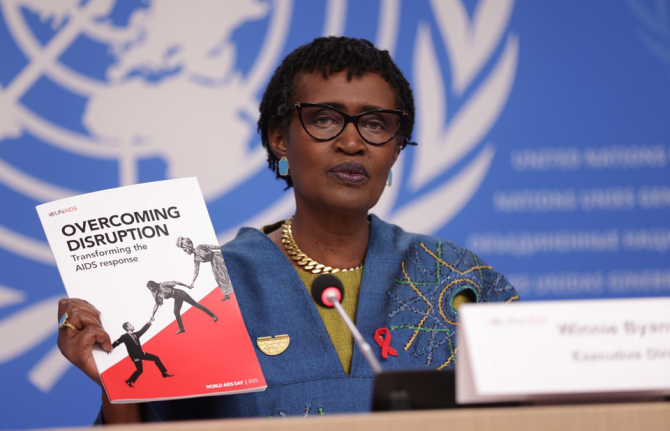
Press Release
UNAIDS releases its 2025 World AIDS Day report: Overcoming disruption, transforming the AIDS response
25 November 2025 25 November 2025The 2025 funding crisis has thrown the AIDS response into turmoil with massive disruptions to HIV prevention and community led services, particularly for the most vulnerable. However, the new report by UNAIDS shows evidence that resilience, investment and innovation combined with global solidarity still offer a path to end AIDS.
GENEVA, 25 November 2025—The global response to HIV has suffered its most significant setback in decades, warns a new UNAIDS report released today ahead of World AIDS Day 2025. Overcoming Disruption, Transforming the AIDS Response details the far-reaching consequences of international funding reductions and lack of global solidarity which sent shockwaves through low- and middle-income countries heavily affected by HIV.
Abrupt reductions in international HIV assistance in 2025 have deepened existing funding shortfalls. The OECD estimates that external health assistance is projected to drop by 30–40% in 2025 compared with 2023, causing immediate and even more severe disruption to health services in low- and middle-income countries.
“The funding crisis has exposed the fragility of the progress we fought so hard to achieve,” said Winnie Byanyima, Executive Director of UNAIDS. “Behind every data point in this report are people—babies and children missed for HIV screening or early HIV diagnosis, young women cut off from prevention support, and communities suddenly left without services and care. We cannot abandon them. We must overcome this disruption and transform the AIDS response.”
A global system in shock
Prevention services—already under strain before the crisis—have been hit hardest. Major reductions in access medicines to prevent HIV (pre-exposure prophylaxis referred to as PrEP) and sharp declines in voluntary medical male circumcision for HIV prevention have left a growing protection gap for millions. The dismantling of HIV prevention programmes designed with and for young women have deprived adolescent girls and young women of HIV prevention, mental health, and gender-based violence services in many countries. This increases their vulnerability further—already in 2024 there were globally 570 new HIV infections every day among young women and girls aged 15—24.
Community-led organizations—the backbone of the HIV response and who were able to reach people most vulnerable to HIV—report widespread closures, with more than 60% of women-led organizations suspending essential programmes. Services for key populations including men who have sex with men, sex workers, people who inject drugs and transgender people have also been severely impacted.
A failure to reach the 2030 global HIV targets of the next Global AIDS Strategy could result in an additional 3.3 million new HIV infections between 2025 and 2030.
Mounting human rights concerns
The funding crisis has unfolded against a deteriorating global human rights environment, with particularly severe consequences for marginalized populations. In 2025, the number of countries criminalizing same-sex sexual activity and gender expression rose for the first time since UNAIDS began monitoring punitive laws in 2008. Restrictions on civil society—particularly those working with key populations globally and young women and girls in sub-Saharan Africa—are further disrupting essential access to HIV services.
Resilience and innovation offer hope
Despite these challenges, several countries have taken swift action in a bid to close funding gaps. As a result, many countries are showing resilience when it comes to HIV treatment delivery. Some countries have reported relatively steady numbers or even an increase in new initiations on antiretroviral therapy as a result of swift action to maintain services.
Nigeria, Uganda, Côte d’Ivoire, South Africa, and Tanzania have all committed to increasing domestic investments in HIV services. UNAIDS is working with more than 30 countries to accelerate national sustainability plans.
Innovation is also gaining momentum. HIV prevention technologies—including twice yearly injections to prevent HIV—have the potential to prevent tens of thousands of new infections in high-burden settings. New partnerships announced in 2025 by the Gates Foundation, UNITAID, the Global Fund to Fight AIDS, TB and Malaria, and the US President’s Emergency Plan for AIDS Relief have launched initiatives to ensure widespread access to affordable generic formulations of life-saving medicines, for as little as USD 40 per person per year in some cases.
“We know what works—we have the science, tools, and proven strategies,” said Ms. Byanyima. “What we need now is political courage. Investing in communities, in prevention, in innovation and in protecting human rights as the path to end AIDS.”
Developments in the latter half of 2025 offer some hope for sustaining critical international financing. The US released its new America First Global Health Strategy and is establishing bilateral agreements with around 70 countries to continue funding during a progressive transfer to self-reliant national HIV responses over the next two to five years. The Global Fund’s recent Eighth Replenishment conference also generated pledges of USD $11.34 billion with more partners still to come forward. This is an extraordinary achievement.
A call to action
Today, 40.8 million people are living with HIV worldwide, 1.3 million new infections occurred in 2024, and 9.2 million people are still not accessing treatment.
This World AIDS Day, UNAIDS is calling on global leaders to:
- Reaffirm global solidarity, multilateralism and the collective commitment to fight and end AIDS together.
- This is the bedrock of our progress to date. The health and debt commitments in the Leaders Declaration at the G20 Summit and the Global Fund replenishment last weekend reinforce signs of hope.
- Maintain funding for the response
- International assistance must be sustained for countries that need it most to ensure a gradual, secure and sustainable transition to domestic financing.
- Domestic financing cannot grow fast enough to fill the gap, so continued global support is critical.
- Commitments to urgent and meaningful debt restructuring per the G20 Leaders Declaration are essential to release resources currently tied up in debt repayments.
- Invest in innovation, including affordable long-acting prevention and treatment options.
- Expand and accelerate the roll out of lenacapavir to move quickly to reach 20 million people
- License more companies to produce to scale to reduce the costs further
- Uphold human rights. Empower communities.
- We call on all partners to defend the right to health as a fundamental human right. This means standing firm for bodily autonomy and sexual and reproductive health and rights, ensuring that every person has the freedom and dignity to make decisions about their own body and health.
- And we must strengthen community-led action, because communities are at the heart of every successful response. Their voices, leadership, and lived experience drive progress and accountability.
After decades of struggle, the global HIV response was within reach of its goal of ending AIDS as a public health threat by 2030. The world has come too far—and achieved too much—to allow progress to unravel at this moment of historic opportunity.
“This is our moment to choose,” Ms. Byanyima urged. “We can allow these shocks to undo decades of hard-won gains, or we can unite behind the shared vision of ending AIDS. Millions of lives depend on the choices we make today.”
UNAIDS
The Joint United Nations Programme on HIV/AIDS (UNAIDS) leads and inspires the world to achieve its shared vision of zero new HIV infections, zero discrimination and zero AIDS-related deaths. UNAIDS unites the efforts of 11 UN organizations—UNHCR, UNICEF, WFP, UNDP, UNFPA, UNODC, UN Women, ILO, UNESCO, WHO and the World Bank—and works closely with global and national partners towards ending the AIDS epidemic by 2030 as part of the Sustainable Development Goals. Learn more at unaids.org and connect with us on Facebook, Twitter, Instagram and YouTube.
Report

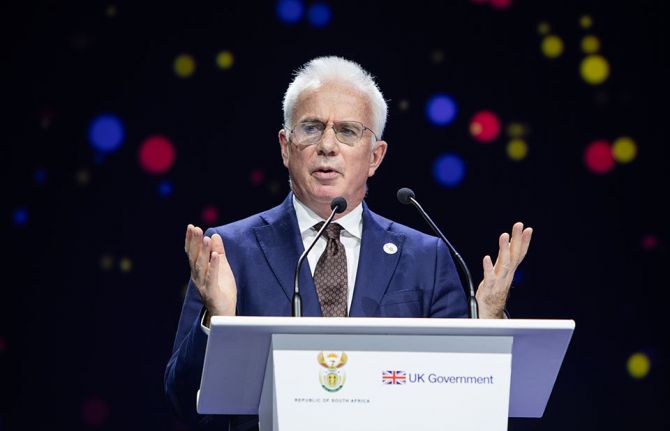
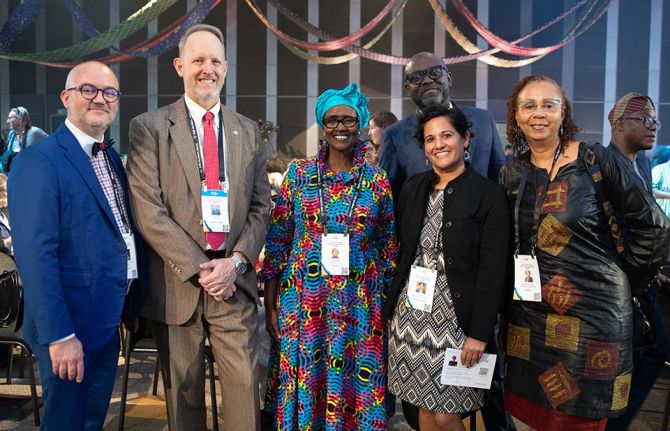
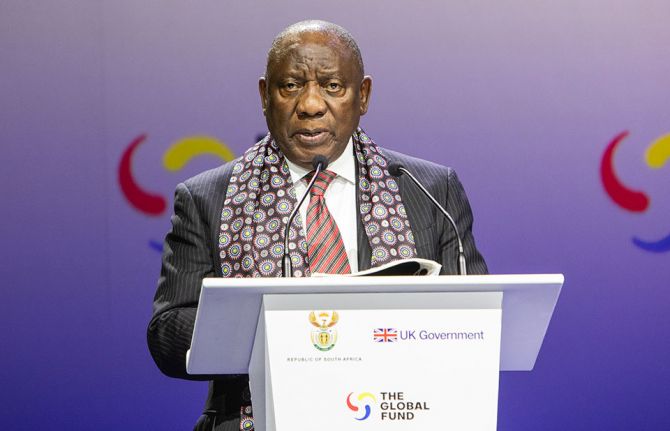
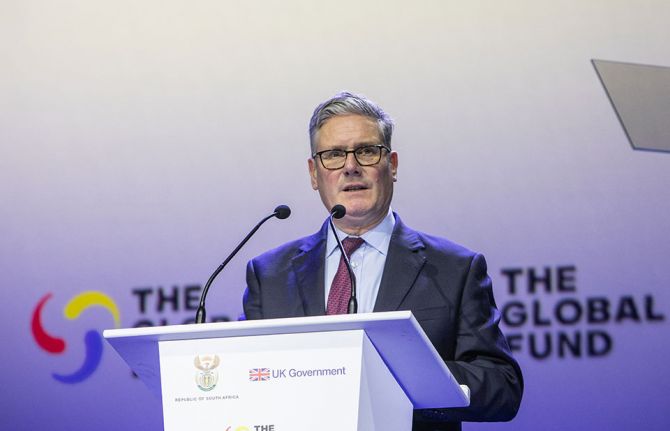
Press Release
UNAIDS applauds strong demonstration of global solidarity at the eighth replenishment of the Global Fund to Fight AIDS, TB and Malaria
24 November 2025 24 November 2025JOHANNESBURG/GENEVA, 24 November 2025—UNAIDS welcomes the important pledges from donors for the Global Fund to Fight AIDS, Tuberculosis and Malaria (Global Fund), at its eighth replenishment conference held in Johannesburg, South Africa on 21 November. The event, co-hosted by President Ramaphosa of South Africa and Prime Minister Starmer of the United Kingdom, was held on the margins of the G20 Leaders’ Summit.
Partners around the world pledged US$ 11.34 billion to sustain the fight against AIDS, tuberculosis and malaria which will save millions more lives, and strengthen systems for health. This is a significant achievement and a powerful demonstration of global solidarity in the face of uncertainty and massive disruptions to the HIV response.
“AIDS is not over,” said Winnie Byanyima, UNAIDS Executive Director. “We commend donors for this strong show of support. These pledges will help protect future generations and accelerate progress toward ending these epidemics. But we must go further—our shared goal is US$18 billion, and we look forward to additional pledges to close the gap.”
UNAIDS thanks South Africa and the United Kingdom for hosting this historic Replenishment—the first ever held on the African continent. African countries, themselves, recipients of Global Fund grants, collectively pledged US$ 51.59 million, reaffirming their commitment to financing their own health systems and driving innovation.
The Global Fund’s new approach—embracing agile, country-driven partnerships and mobilizing domestic resources—aligns with UNAIDS’ vision of shared responsibility and sustainability. These investments will not only save lives but also strengthen health systems, bolster economic stability, and advance global health security.
UNAIDS calls on all partners to maintain momentum and ensure resources are swiftly translated into programmes that reach people in need. UNAIDS stands together with the Global Fund. With essential data to guide the Global Fund’s investments, with policy reform at the country level, and with prevention at the centre, we can overcome the disruption to the global HIV response and we can end AIDS.
UNAIDS
The Joint United Nations Programme on HIV/AIDS (UNAIDS) leads and inspires the world to achieve its shared vision of zero new HIV infections, zero discrimination and zero AIDS-related deaths. UNAIDS unites the efforts of 11 UN organizations—UNHCR, UNICEF, WFP, UNDP, UNFPA, UNODC, UN Women, ILO, UNESCO, WHO and the World Bank—and works closely with global and national partners towards ending the AIDS epidemic by 2030 as part of the Sustainable Development Goals. Learn more at unaids.org and connect with us on Facebook, Twitter, Instagram and YouTube.

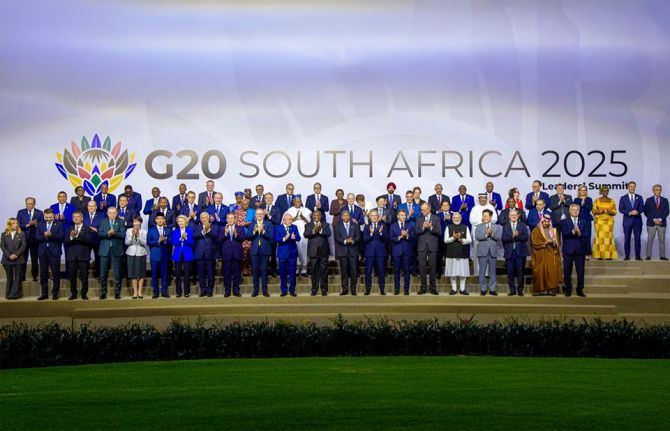
Press Release
UNAIDS Executive Director Winnie Byanyima, speaking at G20 Summit, welcomes Leaders’ Declaration
22 November 2025 22 November 2025GENEVA/JOHANNESBURG, 22 November 2025 — UNAIDS Executive Director Winnie Byanyima today addressed G20 leaders on global inequalities, and welcomed the Declaration agreed at the summit.
The declaration includes a call to action from the G20 on what it labels “deepening inequality” and calls for greater action to improve the world’s future health security and address today’s pandemics like AIDS. G20 leaders highlighted the constrained "fiscal space” for low- and middle-income countries and called for comprehensive and coordinated action on debt vulnerabilities as well as for increased sustainable financing for health and tackling disease, through domestic revenue and through the Global Fund to Fight AIDS, TB, and Malaria. They highlighted the opportunity to increase access to medicines through the WHO Pandemic Agreement. The declaration also reaffirms the centrality of the United Nations in achieving these goals.
Ms Byanyima addressed the G20 heads of state today and the G20 Health Ministers earlier this month. She did so as a part of Extraordinary Committee of Independent Experts on Global Inequality commissioned by President Ramaphosa, presenting its report and proposal for an International Panel on Inequality today, and at the health ministerial with the Global Council on Inequality, AIDS, and Pandemics, which called for a debt standstill and new financing facility, reformed access to new medicines, and a focus on social determinants and communities.
Ms Byanyima praised South Africa putting for “putting the issue of inequality at the very heart of the international agenda.” Ms Byanyima paid tribute to President Ramaphosa for “lighting the way to a world that is both fairer and safer. I am a proud African once again today.” She praised G20 leaders for taking up elements of the agendas of the Extraordinary Committee and Global Council in today’s statement and called on them to translate today’s words into action. “Concrete action is needed now on reducing inequality, on suspending and restructuring debt, and on financing the global response to AIDS and the pandemics of today and tomorrow.”
/ENDS
Notes to Editors
The G20 Leaders’ Declaration is at https://g20.org/wp-content/uploads/2025/11/2025-G20-Summit-Declaration.pdf
The report of the Extraordinary Committee of Independent Experts on Global Inequality is at
https://g20.org/wp-content/uploads/2025/11/2-G20-Global-Inequality-Report-Full-and-Summary.pdf
The report of the Global Council on Inequality, AIDS, and Pandemics is at

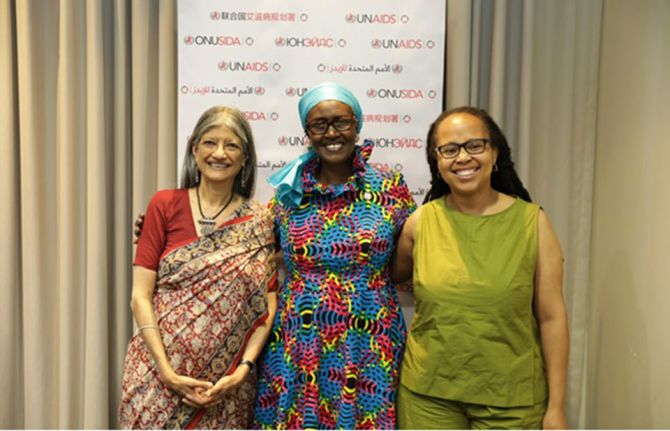


Press Release
UNAIDS executive director Winnie Byanyima addresses G20 Leaders’ summit in Johannesburg, warns that global inequalities are prolonging the AIDS crisis and other pandemics
21 November 2025 21 November 2025GENEVA/JOHANNESBURG, 21 November 2025— UNAIDS Executive Director and United Nations Under-Secretary-General Winnie Byanyima has warned G20 leaders that entrenched inequalities within and between countries are a threat to the whole world.
Noting that inequalities are prolonging the AIDS crisis and leaving the world vulnerable to future pandemics, she urged leaders to establish an International Panel on Inequality, which could support governments and multilateral agencies to develop national and international policies to address inequality.
“In a world pulled apart by extreme inequality, no one is safe,” said Ms Byanyima. “G20 leaders need to tackle the inequality emergency to build a safer world for all.”
Ms Byanyima will address the G20 Leaders’ Summit on 22 November in Johannesburg on behalf of the G20 Extraordinary Committee of Independent Experts on Global Inequality, commissioned by President Cyril Ramaphosa. The Committee, chaired by Nobel Economics Laureate Joseph Stiglitz, has called for the establishment of an International Panel on Inequality, inspired by the Intergovernmental Panel on Climate Change (IPCC). New analysis published by the Committee report shows that between 2000 and 2024, the world’s top 1% captured 41% of all new wealth, while just 1% went to the bottom 50%.
Amid steep cuts in donor funding for the global AIDS response, Ms Byanyima called on leaders to enable immediate action to address the unaffordable debt interest payments being paid by low- and middle-income countries, so that their governments can devote the resources that are needed to end AIDS and other pandemics. Developing countries are chokingon debt servicing, amounting to nearly $3 trillion. Servicing this debt deprives governments of revenues that are essential to fund investments in health systems and in the social determinants of health.
Ms Byanyima serves both as a member of the G20 Extraordinary Committee, and as the Convenor of the Global Council on Inequality, AIDS and Pandemics. Research released ahead of the G20 by each of the two expert groups demonstrates that persistent high inequality is a global emergency – stoking political instability, holding back the economy, and undermining public health.
Research by the Global Council shows that high levels of inequality, within and between countries, are making the world more vulnerable to pandemics, making pandemics more economically disruptive and deadly, and making them last longer; pandemics in turn exacerbate inequality, driving a cyclical, self-reinforcing relationship.
Evidence shows that more unequal countries have seen significantly higher COVID-19 mortality, higher rates of HIV infection, and higher AIDS mortality as they have struggled to mount effective pandemic responses.
Evidence also shows that social determinants of pandemics generate underlying vulnerability. In Brazil, for example, people without basic education were several times more likely to die from COVID-19 than those completing elementary school. In England, living in overcrowded housing was linked to higher mortality rates from COVID-19.
The damaging impact of entrenched inequalities between countries was illustrated during the height of the COVID-19 pandemic: while high-income countries were able to finance surges in health spending and economic mitigation measures and roll out vaccines, low-income countries, by contrast, were held back by severe financial constraints and were also forced to wait for vaccines, which hampered the COVID-19 response worldwide.
Ms Byanyima praised South Africa’s leadership of the G20, focused on “Solidarity, Equality, Sustainability”, for advancing international progress on access to medicines, on debt and financing, and for its drive domestically for universal health coverage through National Health Insurance, stating that “President Ramaphosa is lighting the way to a world that is both fairer and safer.”
“The evidence,” said Ms Byanyima, “is unequivocal: first, that inequality is a danger to the world, and that reducing inequalities within and between countries will make everyone safer; second, that these inequalities can be overcome, if leaders act together. Inequality is not fate; it is a disastrous collective international policy choice that leaders can choose now to unmake.”
/ENDS
Notes for editors
UNAIDS Executive Director Winnie Byanyima was a leader of the report of the Global Council on Inequalities, AIDS and Pandemics, and of the report of the G20 Extraordinary Committee of Independent Experts on Global Wealth Inequality.
The Global Council on Inequality, AIDS and Pandemics is a high-level initiative convened by UNAIDS to confront how inequalities drive pandemics—and how pandemics, in turn, deepen inequality. Convened by Winnie Byanyima, the Council is co-chaired by Chairperson of the One Economy Foundation and Namibia’s former First Lady Monica Geingos, Director of the UCL Institute of Health Equity Professor Sir Michael Marmot, and Nobel laureate Joseph E. Stiglitz. It brings together leaders across economics, public health, human rights and finance to build a policy environment in which inequalities can be addressed so the world can end AIDS and better prepare for and respond to future pandemics.
The G20 Extraordinary Committee of Independent Experts on Global Inequality report, commissioned by President Ramaphosa as G20 President, is authored by the 2025 G20 Extraordinary Committee of Independent Experts on Global Inequality, led by Joseph E. Stiglitz, and joined by Adriana Abdenur, Winnie Byanyima, Jayati Ghosh, Imraan Valodia and Wanga Zembe-Mkabile.

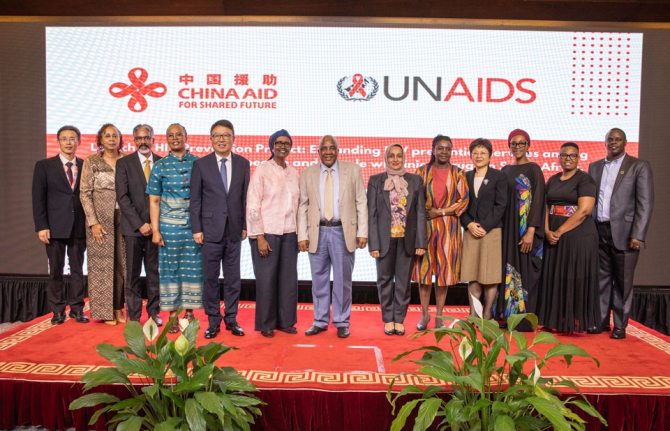
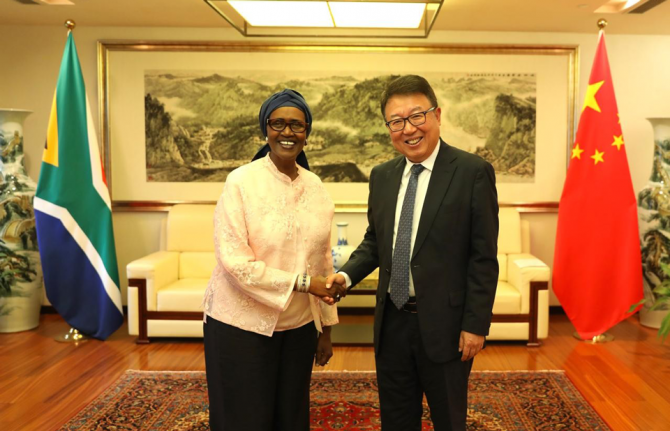
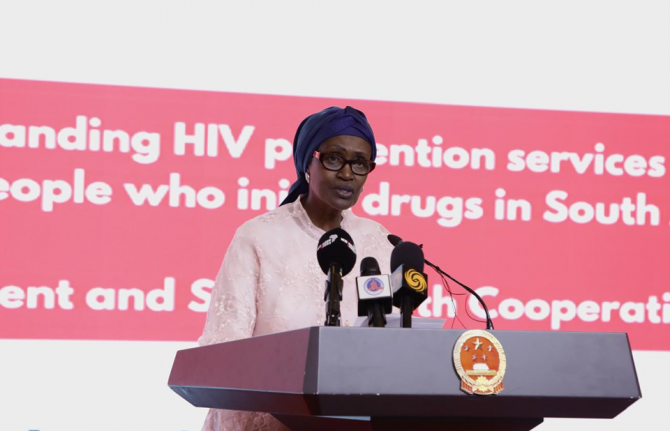
Press Release
People’s Republic of China unveils US$ 3.49 million HIV prevention support for South Africa, facilitated by UNAIDS
21 November 2025 21 November 2025GENEVA/JOHANNESBURG, 20 November 2025—The People’s Republic of China, through the China Global Development and South-South Cooperation Fund, has announced a two-year US$ 3.49 million (approximately 60 million South African rand) funding partnership to expand HIV services across South Africa. The agreement, facilitated by UNAIDS, will boost South Africa’s efforts to end AIDS as a public health threat.
The agreement will go towards HIV prevention services, particularly focusing on young people and people who inject drugs as some of the groups at most risk of HIV infection. South Africa has the world's largest HIV epidemic with around 8 million people living with the virus. Young people aged 15-24 account for over a third of new infections and HIV prevalence among people who inject drugs is 7% higher than among the general population.
“Through this investment, the People’s Republic of China is working hand in hand with South Africa to stop new HIV infections echoing the themes of South Africa’s G20 Presidency: solidarity, equality and sustainability,” said Winnie Byanyima, Executive Director of UNAIDS. “It shows China’s commitment to multilateralism and advancing South-South cooperation, through sharing of technology, innovation, and grant funding in our pursuit of universal health coverage and the goal of ending AIDS by 2030.”
“This project, funded by the People’s Republic of China, is concrete action to implement the Global Development Initiative and jointly build a global community of health for all. We are honoured to deepen our longstanding partnership with South Africa through this grant to support the country’s HIV response,” said His Excellency, the Chinese Ambassador to South Africa, Wu Peng. “China stands firmly with South Africa as it strengthens its HIV prevention and treatment programmes. In addition to this project, we stand ready to assist South Africa in establishing a sustainable HIV/AIDS response system through policy dialogue, innovative drug supply, technology transfer, and capacity building. We remain dedicated to working together to build a healthier, more resilient future for our two nations,” he added.
The two-year funded project will reach 54 000 adolescents and young people in Technical and Vocational Education and Training colleges across seven provinces. It will also support 500 people who inject drugs through harm reduction and opioid agonist therapy programmes in Gauteng province.
“On behalf of the Government of South Africa, I extend our sincere appreciation to the Government of China for this vital support to our national HIV response,” said Dr. Aaron Motsoaledi, Minister of Health of South Africa. “This contribution strengthens our shared commitment to safeguarding the health and dignity of people living with and affected by HIV."
The initiative promotes South South collaboration between South Africa and China within the BRICS Framework and builds on shared experiences in addressing HIV among vulnerable populations. It also reinforces global solidarity and international cooperation and assistance, which has been the foundation of the global HIV response since the start of the pandemic.
“Today’s event is more than the unveiling of a project,” said Mmapaseka Steve Letsike, Deputy Minister in the Presidency for Women, Youth and Persons with Disabilities of South Africa. “It is a reaffirmation of our shared humanity and our shared responsibility to protect the health, dignity and futures of young people and key populations across South Africa. It is, ultimately, a statement that no one will be left behind.
The funding announcement follows the signing of a Memorandum of Understanding in July 2024 between UNAIDS and China’s International Development Cooperation Agency, formalizing cooperation on HIV, pandemics, and health. Today’s announcement is the first major grant mobilized through the partnership, supporting South Africa’s HIV response.
“We are at a critical moment in the global HIV response. This year has been marked by disruption. But we have the power to transform. In a new era for global health, China is accelerating transformation, fostering equity, and building self-reliance. This project will save lives and drive innovations that stop new HIV infections,” said Ms Byanyima.
UNAIDS will support the project in collaboration with the China International Centre for Economic and Technical Exchanges, the Government of South Africa through the Departments of Health, Higher Education and Training and Correctional Services, the United Nations Office on Drugs and Crime, the World Health Organization and Higher Health, a non-profit organization and implementing arm of the Department of Higher Education and Training.
UNAIDS
The Joint United Nations Programme on HIV/AIDS (UNAIDS) leads and inspires the world to achieve its shared vision of zero new HIV infections, zero discrimination and zero AIDS-related deaths. UNAIDS unites the efforts of 11 UN organizations—UNHCR, UNICEF, WFP, UNDP, UNFPA, UNODC, UN Women, ILO, UNESCO, WHO and the World Bank—and works closely with global and national partners towards ending the AIDS epidemic by 2030 as part of the Sustainable Development Goals. Learn more at unaids.org and connect with us on Facebook, Twitter, Instagram and YouTube.
Contact
UNAIDS South AfricaZeenat Abdool
tel. +27 827 788 080
abdoolz@unaids.org
UNAIDS Global Communications
Robert Shivambu
tel. +27 (0) 83 608 1498
shivambuh@unaids.org

